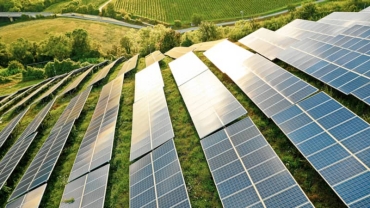
UN IPCC climate change report: What New Zealand businesses should know
The Working Group 2 contribution to the Intergovernmental Panel on Climate Change’s (IPCC) Sixth Assessment Report (AR6) confirms humans and natural systems are already feeling the effects of climate change and some systems are being pushed beyond their ability to adapt.
For organisations, these findings paint a clear picture of the urgent need to understand the risks of climate change and develop adaptation strategies. The longer businesses delay action on climate change, the harder it will become to protect their operating models and build resilience to its impacts.
What do business leaders need to know about the IPCC’s latest report, and what actions should they take in response to the findings?

What you need to know about the IPCC Assessment Report 6 (AR6)
Strong action can limit the damage. A previous IPCC report released in August 2021 found that the world has warmed 1.1°C since preindustrial times, and is on track to pass 1.5°C of warming in the 2030s. Even with strong mitigation to limit warming to 1.5°C, there will be unavoidable increases in multiple climate hazards that present multiple risks to ecosystems and humans.
In Aotearoa New Zealand, extreme events and a changing climate are already affecting our communities, coastlines, glaciers and ecosystems. The report stresses that there is a narrowing window of opportunity to enable climate resilient development, but it is still possible.
Key findings from the AR6 report include:
Climate change is already affecting food and water security. Extreme weather and climate events have exposed millions of people to acute food insecurity and reduced water security.
An increasing number of people are becoming exposed to extreme heat. Approximately 50-75% of the global population could be exposed to periods of “life-threatening climatic conditions” due to extreme heat and humidity by 2100.
The most vulnerable communities in New Zealand will suffer the most and inequities are expected to worsen as the planet warms. Adaptation actions that address inequalities in Aotearoa are most likely to be effective.
The impacts of climate change will worsen, even at 1.5°C of warming. But, strong mitigation that restricts warming to 1.5°C can limit the losses and damages of climate change.
The link between climate change, biodiversity loss and impacts on human systems is made clear. The report stresses that biodiversity loss is a key risk in every region and can have serious, long-term impacts on communities.
Increasing complex, compound and cascading risks, where multiple risks interact and manifest across multiple sectors and regions, make managing the impacts of climate change more challenging. For example, in New Zealand, heavy rainfall and wind events have combined to impact road networks, power supply and business activities.
Adaptation in New Zealand is occurring, but not fast enough to limit the impacts of climate change. Delaying actions to reduce emissions and adapt to the impacts of climate change will only increase the costs.

What actions can you take today?
It is more critical than ever to take rapid and strong action to reduce greenhouse gas emissions and adapt to the impacts of climate change.
Companies should form an actionable understanding of the risks they face and develop strategies to mitigate them. They should also capture and report data, examine direct and indirect emissions effects and supply chains, and innovate to reduce emissions in their operations.
The IPCC report makes clear that the impacts of climate change are already here. Corporate leaders are beginning to understand this is not an issue for the future. Publicly traded companies are increasingly being pressured to set and meet ambitious emissions reduction goals while managing expectations for profitable growth and risk exposure. At the same time, some investors stand by with divestiture daggers in hand, ready to cut the carbon out of their portfolios.
- Understand the potential impacts of these findings on your business
- Build resilience to extreme weather events and regulatory change
- Focus on areas of risk
- Seek to reduce emissions and develop a climate change strategy
- Consider impacts on your risk assessments
Understand the potential impacts of these findings on your business
Review the report, including summaries and regional chapters. Understanding the scope of impacts can help leaders better communicate the “why” of actions that will need to be taken. The findings of this report will underpin New Zealand's National Adaptation Plan due for release later this year. Informed leaders are prepared leaders.
Watch for the IPCC’s Working Group 3 report on mitigation due for release in April 2022.
Build resilience to extreme weather events and regulatory change
Business leaders should begin to look at how to enhance their own resilience to extreme weather events and changes in the policy landscape. Critically, ensure you are proactive in your adaptation planning, rather than reactive, as is often the case in disaster management. Assess how siting decisions, property and infrastructure can be improved cost-effectively, as prices for services will likely increase along with demand. You may consider revisiting insurance policies once your assessment of exposures to extreme weather is complete.
Focus on areas of risk
Leaders should look to elevate their entire business ecosystem by addressing physical risks from extreme weather events on supply chains and transition risks from the shift to a low emissions economy. Focused attention today can potentially prevent an incident or policy shift from spiralling into a large-scale crisis that could threaten the entire organisation. Being attuned to potential threats could help create competitive advantage.
Seek to reduce emissions and develop a climate change strategy
Take action to reduce emissions and reduce compliance costs, such as using electric vehicles, reducing air travel, choosing more efficient appliances and processes, and seeking to decarbonise supply chains. Increasing awareness among employees of a company-wide, proactive stance against climate change will improve buy-in and encourage individuals to reduce their own footprints. This will also have benefits in the employment market as public sentiment on sustainability grows.
For entities that are mandated to report on their climate risks, having a comprehensive plan to reduce emissions and future proof the company is critical. Companies will be expected to publicly report on the potential financial impacts of climate change on their business from 2023, and will benefit from moving quickly to ensure climate change strategies are robust. More information on this can be found in this PwC report.
Consider impacts on your risk assessments
The New Zealand Government has made it mandatory for large companies to report on their climate risk from 2023. For entities that are mandated to report on their climate risks, having a comprehensive plan to reduce emissions and future proof the company is critical. Companies will be expected to publicly report on the potential financial impacts of climate change on their business from 2023, and will benefit from moving quickly to ensure climate change strategies are robust.
The report's strengthened warnings about the risks of the physical impacts of climate change will factor into private sector assessments. How does the latest analysis by the IPCC affect your assumptions about exposure to extreme weather events, demand shifts and/or opportunities in your business and industry, and how effective your adaptation strategy is?
About the IPCC
The IPCC is a United Nations body tasked with assessing the science of climate change, its implications and potential future risks, as well as to put forward adaptation and mitigation options. Through its Assessment Reports (ARs), the IPCC determines the state of knowledge on climate change and provides critical input into organisational strategy, government policymaking and international climate negotiations.
Working Group 2 is charged with assessing the state of knowledge on impacts, adaptation and vulnerability. The key findings of the report, which runs over 3,500 pages long, are distilled into a short ‘Summary for Policymakers’, which is approved line-by-line by all 195 IPCC member governments.
IPCC AR’s are split into three parts: Working Group 1 - The Physical Science Basis, which was published in August 2021; Working Group 2 - Impacts, Adaptation and Vulnerability, released earlier this week; and Working Group 3 - Mitigation, due for release in April.
Each Working Group brings together hundreds of scientists from around the world, and the reports are subject to a rigorous review process involving independent experts and government. There were a number of New Zealand experts involved in the report, and the report’s findings form the foundational evidence base for climate adaptation.
How we can help
Sustainability and Climate Change Team
PwC partners with organisations to provide a long-term holistic view and embed sustainability objectives across business strategies. Helping public and private organisations to stay ahead of the game while also supporting their licence to operate, PwC is focused on creating a sustainable and environmentally responsible country for all. With deep expertise, broad capabilities and a fully integrated service, PwC addresses challenges with the most sustainable, effective and efficient business solutions.
PwC’s TCFD diagnostic tool will support you to understand how your existing public disclosures, processes and policies align with the TCFD recommendations and where priority areas to address might lie.












